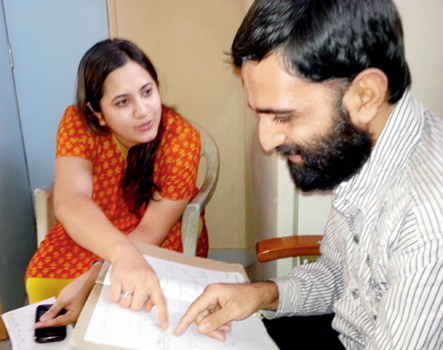 Sayed Mohsen Mirjalili with Upasana Daryanani, a volunteer at Shraddha Rehab, Borivli
Sayed Mohsen Mirjalili with Upasana Daryanani, a volunteer at Shraddha Rehab, Borivli
As a teenager growing up in Yazd, a small city in Iran, I always dreamt of visiting India. I had never met them, but thanks to all the Amitabh Bachchan and Shah Rukh Khan movies I saw, they were all known to me,” Mirjalili told this correspondent, as he waited for travel documents from the Iranian Embassy in India which will allow him to fly back to his homeland.
But how did he land up on a footpath in Chembur? Mirjalili says he had saved money from his ceramic business for years to make his dream come true. “I boarded a flight from Tehran to Mumbai and flew in via Dubai in January, 2013 (a fact corroborated by the Iranian Embassy). I then travelled to Goa and some other places. I was on my way back to Mumbai. The next I remember, I was in a rehab centre here,” he says, looking around helplessly.
Upasana Daryanani, a volunteer at the Borivli-based Shraddha Rehab, says Mirjalili is on his way to full recovery. The Iranian national has even told her that he has a six-year-old daughter called Pariza. “Sayed’s father is a well-known religious teacher, while his younger brother is a university professor. Mirjalili keeps thanking us and Indian hospitality,” Daryanani recalls.
“Mumbai’s people saved my life,” agrees Mirjalili. On his daily morning walk one day, Ajay Shah, a businessman from Chembur, observed a mentally unstable man, who in spite of his tattered clothes displayed a certain kind of uniqueness. “He would never beg and politely accept whatever was offered to him to eat. I called Dr Bharat Vatvani, a Borivli-based psychiatrist, who had earlier helped treat and then unite an abandoned mentally challenged girl from Nagpur with her family,” he told SMD.
Dr Vatvani, who runs Shraddha Rehabilitation Foundation, a home for the mentally ill, recalls being called on the night of January 25. “The man was freezing and willingly got into my car,” recalls Dr Vatvani. It was only after reaching his clinic that he realised the patient was a foreigner. “He could not remember his name and displayed symptoms of schizophrenia,” Dr Vatvani says. Dr Vatvani then approached DCP Ashwati Dorje of FFRO (Foreigners Regional Registration Office), who coordinated with the Iranian Consulate in Mumbai to expedite the process. The police were able to trace his family back to Iran.
Gulam Askari, an official from the Consulate General of the Islamic Republic of Iran said he was touched by the humanitarian effort. “We have issued a letter and a pass valid for 20 days that will enable him to enter Iran,” he said. Sayed’s return journey is being sponsored by his delighted father, who is too old to come and escort his son home.
